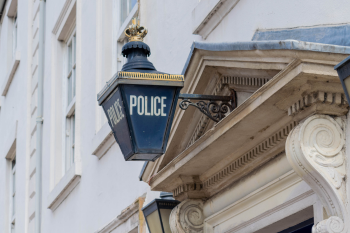Here at SFJ Awards, we have always championed the many types of people, roles, and ways to develop the workforce across all the sectors we serve. Diversity and inclusion within Fire and Rescue, like many other Justice sectors, has always been a challenging task, with a real ‘chicken and egg’ quandary when trying to understand why women working in Fire and Rescue is still viewed by many as unexpected and unusual.
We’re delighted to introduce the first in our series of Guest Stories, from Caroline Anderson, Vice Chair of Women in the Fire Service UK (WFS), and Crew Manager/Recruitment and Retention Officer at Devon and Somerset Fire and Rescue Service. Caroline was awarded the Queen’s Fire Service Medal for distinguished service in 2017, and here she tells us more about the important work the WFS do to advocate careers for women in the fire service.
How did the Women in the Fire Service UK come about?
“The Women in the Fire Service UK began as a self-help group in the mid-nineties, tackling issues affecting women in the service. Concerns like inadequate station facilities and personal protective equipment, to bullying and pornography. Women wanted non-judgmental and safe spaces to learn and network, so many conferences and seminars were organised.
“Personally, I attended one of the WFS events in Newcastle in 2010 and was so incredibly inspired by the women I met there, that I became a regional representative for WFS. Our reps are our champions of the organisation. Over the decades our network has grown, and we now have over 40 UK fire services who are corporate members.”
Why is it so important to endorse women working in the fire service?
“Gender imbalance is high in the fire service and women are still underrepresented – just 6.4% of firefighters in England are women, and less than 20% of total staff are women. Because firefighting is still seen as a ‘man’s job’, many girls hold back from exploring careers in the fire service.
“There are lots of recent examples of this in the press and media, take four-year-old Esme, she had not seen any women firefighters, so thought she could not be one. The more women who are supported in the fire service and are visible as role models, the younger women will see it as a career path too. Out of over 50 Chief Fire Officers in the UK, only six are women. We want to see these figures improve.
How does the WFS champion and promote careers and opportunities for women in fire services?
“We specialise in organising and delivering annual training and development events, which are open to everyone, not just women. We provide mentors and give advice to those thinking about careers, as well as a portal on our website to search for jobs. And we speak in schools and careers fairs, and at fire and rescue service equality, diversity, and inclusion events.”
What learning and development tips would you give to anyone interested in how to start a career in the fire service?
“Have the self-belief and confidence to learn and progress – there are lots of opportunities in the fire service if you want to take them. WFS encourages and promotes self-development, empowering women to take the path that is right for them. Our training and development events are a huge part of this, inspiring women to reach their full potential and gain valuable skills.
“To apply for a full time firefighter position in Devon and Somerset Fire Service you currently need four GCSEs or equivalent to include English, Math’s and Science, and you need to be able to swim and have a driving license. You do need to be fit and strong and maintain this throughout your career. Many of our women firefighters also train to drive fire appliances, qualifying as an LGV driver – something people often do not think of a woman doing at all and an extremely skillful position to have!”
What would you say to any women (or anyone) looking to join the fire service?
“I would say do it and be an inspiration to others!
“There are so many fantastic roles in the service which are as important and rewarding as a firefighter. I was 38 and working as a legal secretary when I saw an advert outside my local fire station. I really wanted a new challenge in my life, so thought I would give it a go. The fire service is like a family and there are lots of opportunities if you want to progress.
“Many women join the fire service later in life, or single mums with kids, or women coming from completely different work backgrounds. To anyone who dreams of joining the fire service – do not let anyone tell you it’s not the career for you because of your age, gender, physique, or circumstance.”
At SFJ Awards, we’ve found learning about the important work that the WFS do to endorse, promote, and encourage women, and any gender, to develop the skills to pursue a career in the Fire and rescue service, incredibly inspiring. It is vitally important to us that we provide the best possible opportunities for vocational learning that mean anyone can gain the skills and qualifications needed to make an impact, no matter their demographic or circumstance.
Candace Miller, Managing Director, SFJ Awards says:
“Anyone who knows me will be aware how fiercely committed I am to securing equality of opportunity for all and to breaking down barriers to great education, training, and careers. I hope that by sharing this inspiring story of Women in the Fire Service, we at SFJ Awards are helping to encourage even more women and girls to think seriously about joining the fire and rescue services that we are so proud to support.”
Follow Caroline and the team at WFS’ work on Twitter here today. As the UK’s leading provider of fire sector qualifications, find out more about our Fire and Rescue portfolio here, and talk to us about how these qualifications can help you and your workforce today.





